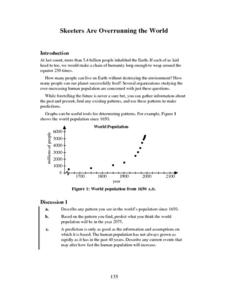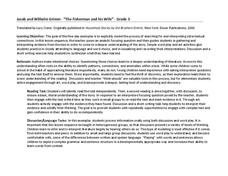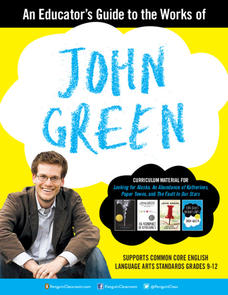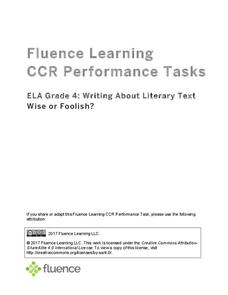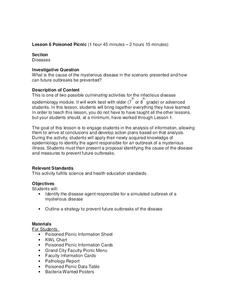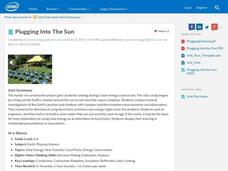Annenberg Foundation
Skeeters Are Overrunning the World
Skeeters are used to model linear and exponential population growth in a wonderfully organized lesson plan including teachers' and students' notes, an assignment, graphs, tables, and equations. Filled with constant deep-reaching...
Curated OER
A Symbol of Protection
Young art critics consider symbolic protection as it has been used in various cultures around the globe. They view body art from the Marquesas Islands, looking for animals, letter, shapes, and patterns. They compare and contrast body art...
Curated OER
The Fisherman and His Wife
Engage conversation and explore the journey as you challenge young readers to interpret the german folktale, "The Fisherman and His Wife" written by literary brothers Jacob and Wilhelm Grimm.
Curated OER
The Book Thief: Discussion Questions
Expand your study of The Book Thief by Markus Zusak with a question for each level of Bloom's Taxonomy. These questions focus on part four of the novel; each is paired with at least one quote from the text for context and teacher reference.
PBS
Earthquakes and Volcanoes
Earth's surface constantly changes thanks to a variety of geological forces; in fact, Australia currently moves faster than GPS technology. Scholars connect the idea of continental drift to earthquakes and volcanoes with the help of an...
It's About Time
How Might Global Warming Affect Your Community?
What effects will global warming have on your community? This last installment of a six-part series focuses on the effects that global warming may have on a community. Brainstorming and discussion allow groups to independently develop...
Equality and Human Rights Commission
Discrimination
Discrimination takes many forms, and lesson eight in the 12-part series addresses many types and their greater impact on society. The lesson uses a presentation, videos, news stories, and discussions to synthesize many different viewpoints.
Penguin Books
An Educator’s Guide to the Works of John Green
The novels of John Green cover the gamut of teenager emotions. A guide to his works provides classroom lesson plans for the novels Looking for Alaska, An Abundance of Katherines, The Fault in Our Stars, and Paper Towns. Each lesson...
Annenberg Foundation
Rhythms in Poetry
Rhyme, rhythm, free verse, imagery: Do these words describe poetry, or jazz music? The answer is both! A resource explores these similarities as scholars watch a video, engage in discussion, read author biographies, write poetry and...
Brigham Young University
A River Runs Through It: Blooms Taxonomy
Designed for teachers who use Norman Maclean's autobiographical A River Runs Through It, this one-page resource offers discussion question structured using Bloom's Taxonomy.
Cornell University
Shedding a "Little" Light on Cancer Surgery
Many types of cancer treatments now depend on nanotechnology—a big "little" discovery. Scholars begin by removing "malignant" tissue from simulated brains, one using fluorescent markers thanks to nanotechnology and one without. This...
Newseum
Putting the Consumer's Questions to Work
Who, what, when, where, why, and how are good questions to ask when evaluating a source. First, scholars find two sources of information relating to a chosen topic. Next, pupils complete a worksheet to gauge the source's credibility....
Serendip
Soap Opera Genetics – Genetics to Resolve Family Arguments
Did she cheat on her husband? Did the hospital switch the babies? Should they have children? As much as this sounds like the plot for a soap opera, all of these questions fit into a single lesson on genetics. Scholars read about three...
LABScI
Acoustics: The Sound Lab
If the delay between a sound and its echo is less than 1/10th of a second, the human ear can’t distinguish it. Through the use of a Slinky, rubber band guitar, and straws, scholars explore where sound comes from and how it travels. Whole...
US Department of Energy
Electric Avenue: Parallel and Series Circuits
Can you infer the wiring diagram of a series of lights based on their behavior alone? Scholars work with multiple boxes of four lights. They must flip the switch and decide how the lights are wired. By applying their knowledge of...
PBS
KidVid: Fractions and Scale
Scale the challenge of learning about ratios and scales. Young mathematicians learn to incorporate fractional measurements when considering scales and scale factors. They use an interactive to investigate the concept and critically...
Fluence Learning
Writing About Literary Text: Wise or Foolish?
A three-part assessment promotes reading comprehension skills. Class members read literary texts and take notes to discuss their findings, answer comprehension questions, write summaries, and complete charts.
Curated OER
The Little Prince: Socratic Questioning Strategy
Challenge readers to read closer in an activity based on the Socratic questioning strategy. As kids read Antoine de Saint Éxupery's The Little Prince, they use sentence starters to ask deeper questions about the text, and to relate what...
Centers for Disease Control and Prevention
Poisoned Picnic
A group of teachers attended a picnic; ten became sick and another four died. Young scholars must solve the mystery of what happened. They research the river, waste water treatment plant, each food that was served, and environmental...
Annenberg Foundation
Spirit of Nationalism
What were the virtues and values that helped form America? Pupils watch and discuss a video, read biographies of early Americans, chart the differences between early American religious movements, write journals and letters, draw, and...
Curated OER
California Fights Sugar
Scholars read articles and have a class discussion on California's efforts to fight obesity. They will read and discuss the effects of sugar on the body and the soda tax that is being proposed in California.
Novelinks
Wildwood Dancing: Questions using Bloom’s Taxonomy of Thinking Process
Readers respond to a series of questions focused onJuliet Marillier's young adult novel Wildwood Dancing, and crafted to reflect the levels in Bloom's Taxonomy.
Curated OER
Paradise Lost: Bloom’s Taxonomy of Thinking Processes
Chapter II of John Milton's Paradise Lost provides the text for a series of comprehension questions crafted using Bloom's Taxonomy.
Intel
Plugging into the Sun
What's cooking? A sizzling STEM unit challenges scholars to build a solar cooker that can successfully cook an egg. The unit opens with a study of Earth's rotation, the sun's energy, and shadows. Pupils use a compass and thermometer to...


